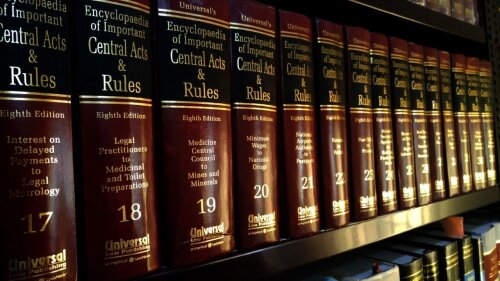Best Mining Law Lawyers in Kolkata
Share your needs with us, get contacted by law firms.
Free. Takes 2 min.
List of the best lawyers in Kolkata, India
About Mining Law in Kolkata, India
Mining law in Kolkata, India refers to the legal principles that govern the exploration, extraction, and management of minerals and resources found in the region. It encompasses both central and state legislation, along with local administrative guidelines specific to West Bengal. Mining law covers all aspects related to the acquisition of mining rights, licensing, environmental compliance, land use, safety standards, and the resolution of disputes arising from mining activities. Given Kolkata’s proximity to coal and mineral-rich belts of West Bengal, mining law is significant for individuals and companies engaged in the mining sector as well as landowners and local communities.
Why You May Need a Lawyer
Engaging a lawyer specializing in mining law becomes crucial due to the complex legal environment surrounding mining activities in Kolkata. Common situations where legal assistance is needed include:
- Obtaining and renewing mining licenses and leases
- Negotiating land acquisition agreements for mining operations
- Ensuring compliance with environmental and safety regulations
- Resolving disputes with government authorities or private parties
- Dealing with local community rights and compensation claims
- Handling regulatory inspections, fines, and penalties
- Advising on tax and royalty obligations related to mineral extraction
- Managing joint ventures and partnership agreements
- Challenging or defending against allegations of illegal mining
A qualified lawyer will help navigate complex paperwork, prevent costly mistakes, and represent your interests in negotiations and legal proceedings.
Local Laws Overview
Mining activities in Kolkata are regulated by a combination of central and state laws and administered by several government agencies. Key legal frameworks include:
- Mines and Minerals (Development and Regulation) Act, 1957 (MMDR Act): The central law governing all major minerals, outlining rules for granting mining leases, environmental clearances, and penalties for violations.
- West Bengal Minor Minerals Rules, 2002: These rules deal with the extraction of minor minerals like sand, stone, and gravel within the state.
- Environmental Laws: Compliance with the Environment (Protection) Act, 1986 and related environmental clearances is mandatory for mining projects.
- Forest Laws: Mining in forest areas requires additional approval under the Forest (Conservation) Act, 1980.
- Labour and Safety Laws: The Mines Act, 1952 and its rules cover mine safety, working conditions, and welfare of workers.
- Land Acquisition: Procedures for acquiring private or government land for mining are governed by the Right to Fair Compensation and Transparency in Land Acquisition, Rehabilitation and Resettlement Act, 2013.
- Royalties and Taxes: The state government levies royalties on extracted minerals; proper accounting and payment are critical to avoid legal complications.
Local authorities like the Directorate of Mines and Minerals, Department of Environment, and the West Bengal Pollution Control Board play vital roles in the regulatory process.
Frequently Asked Questions
What is required to start a mining operation in Kolkata?
You need to obtain the appropriate mining lease or license from the government, secure environmental and forest clearances, and comply with local regulations concerning safety, land use, and royalties.
How do I apply for a mining lease in West Bengal?
Applications are submitted to the district mining office or the Directorate of Mines and Minerals, following a prescribed process that includes submitting technical, financial, and environmental details.
What environmental clearances are needed for mining?
Mining projects generally require an Environmental Clearance from the State Environment Impact Assessment Authority (SEIAA) or Ministry of Environment, Forest and Climate Change. Additional clearances may be needed if forest land or protected areas are involved.
Are there restrictions on mining in certain areas?
Yes, mining is restricted or prohibited in protected forests, wildlife sanctuaries, and certain residential zones. Prior permissions and public consultations may be necessary for operations in sensitive areas.
What taxes and royalties are payable on minerals?
Royalties are calculated based on the quantity and type of mineral extracted. Both central and state governments may levy taxes and royalties, which must be paid regularly to continue operations lawfully.
What are the penalties for illegal mining?
Penalties for illegal mining include hefty fines, confiscation of equipment and minerals, license suspension or cancellation, and possible imprisonment, depending on the seriousness of the offense.
Can mining rights be transferred or sold?
Mining rights may be transferable, subject to compliance with terms of the original lease or license and approval by the relevant government authority.
How are disputes regarding mining leases resolved?
Disputes can be resolved through negotiation, mediation, or litigation in civil courts or specialized tribunals, such as the National Green Tribunal (NGT) for environmental disputes.
How does mining impact local communities, and what are their rights?
Local communities may be entitled to compensation, rehabilitation, and resettlement if their land or environment is affected. Public hearings and consultations are part of the approval process for larger projects.
Do small miners have different rules from large companies?
Yes, small-scale mining of minor minerals is subject to simpler procedures and may only require shorter-term licenses, but all relevant environmental and safety standards still apply.
Additional Resources
Consulting reliable resources is essential. Here are some useful contacts and organizations:
- Directorate of Mines and Minerals, Government of West Bengal - For licensing and regulatory inquiries
- West Bengal Pollution Control Board - For environmental compliance information
- Ministry of Mines, Government of India - For central mining policies
- Department of Environment, Government of West Bengal - For environmental clearance procedures
- Legal Aid Services West Bengal - For affordable or free legal advice
- Local Bar Associations or specialized environmental lawyers - For expert legal guidance
Next Steps
If you need legal assistance in mining law in Kolkata, here are practical steps to follow:
- Identify your specific legal issue, such as licensing, dispute resolution, compliance, or land acquisition.
- Gather all relevant documents, including agreements, government notices, licenses, and correspondence.
- Consult a local lawyer or law firm specializing in mining, environmental, or land use law.
- Check with local authorities or visit the Directorate of Mines and Minerals for guidance on procedural requirements.
- Consider reaching out to legal aid organizations if you need affordable legal help.
- Maintain thorough records of all documents, permits, and communications related to your mining activities.
Taking timely legal advice can help avoid regulatory pitfalls, ensure compliance, and protect your rights and interests in the dynamic mining sector of Kolkata, India.
Lawzana helps you find the best lawyers and law firms in Kolkata through a curated and pre-screened list of qualified legal professionals. Our platform offers rankings and detailed profiles of attorneys and law firms, allowing you to compare based on practice areas, including Mining Law, experience, and client feedback.
Each profile includes a description of the firm's areas of practice, client reviews, team members and partners, year of establishment, spoken languages, office locations, contact information, social media presence, and any published articles or resources. Most firms on our platform speak English and are experienced in both local and international legal matters.
Get a quote from top-rated law firms in Kolkata, India — quickly, securely, and without unnecessary hassle.
Disclaimer:
The information provided on this page is for general informational purposes only and does not constitute legal advice. While we strive to ensure the accuracy and relevance of the content, legal information may change over time, and interpretations of the law can vary. You should always consult with a qualified legal professional for advice specific to your situation.
We disclaim all liability for actions taken or not taken based on the content of this page. If you believe any information is incorrect or outdated, please contact us, and we will review and update it where appropriate.













